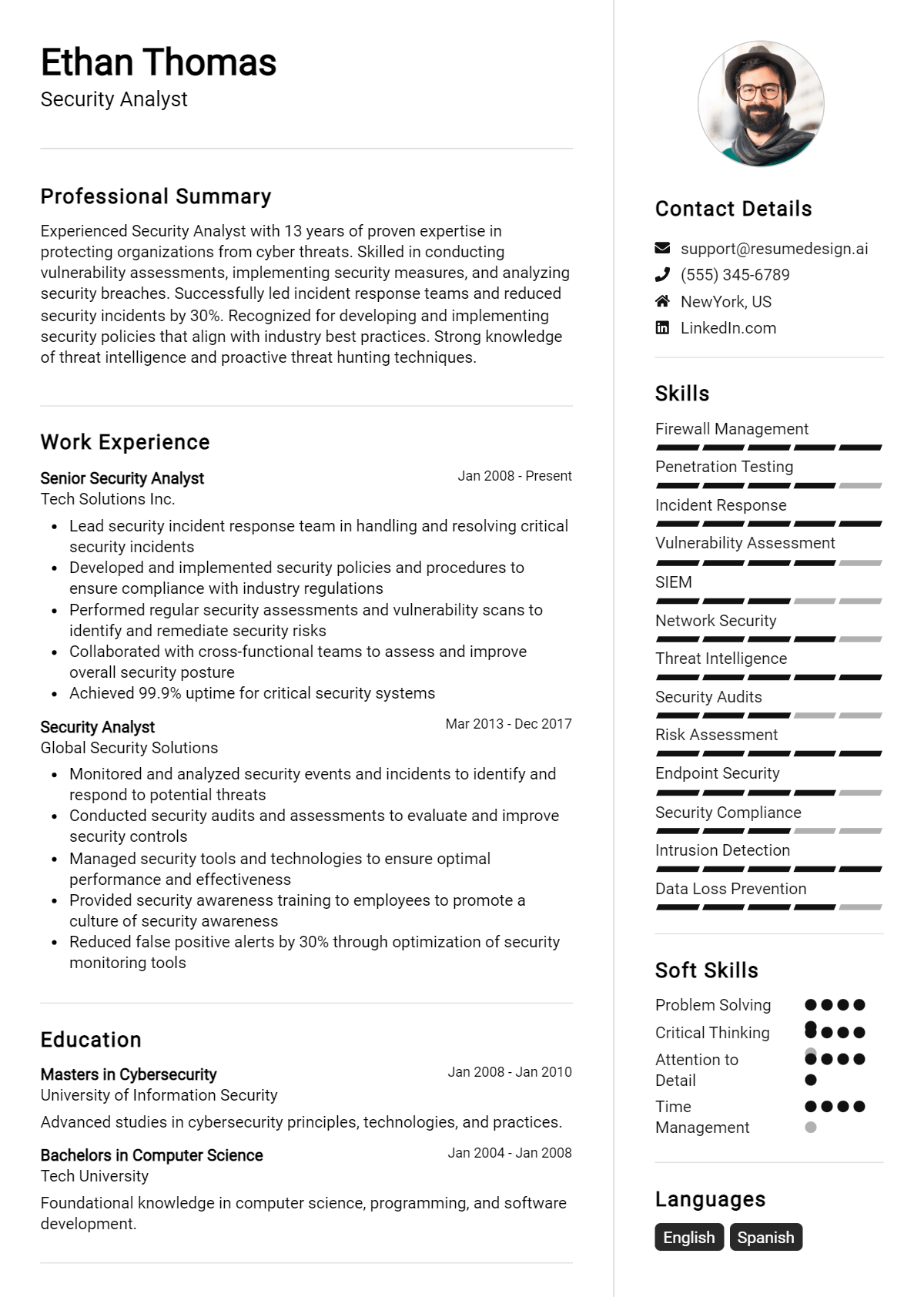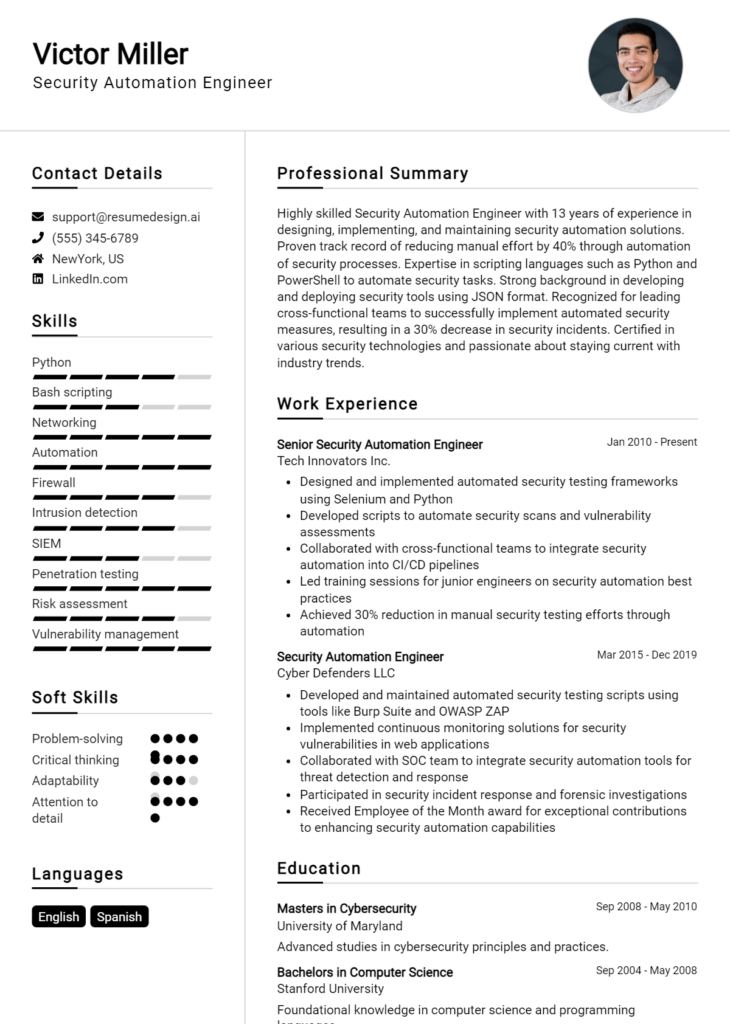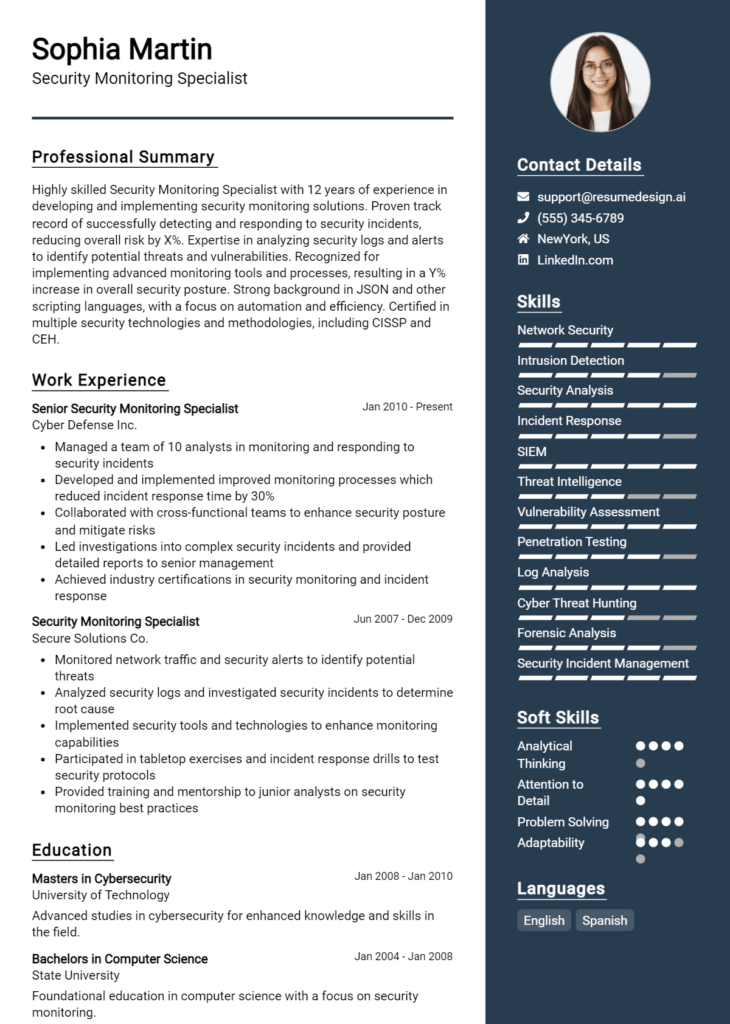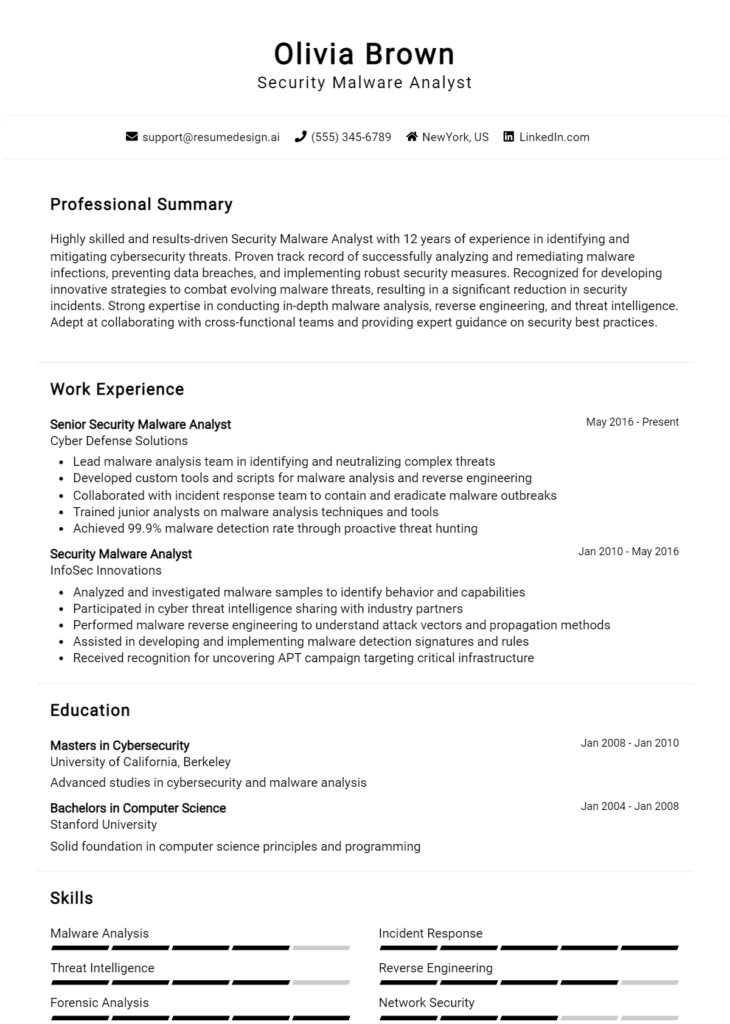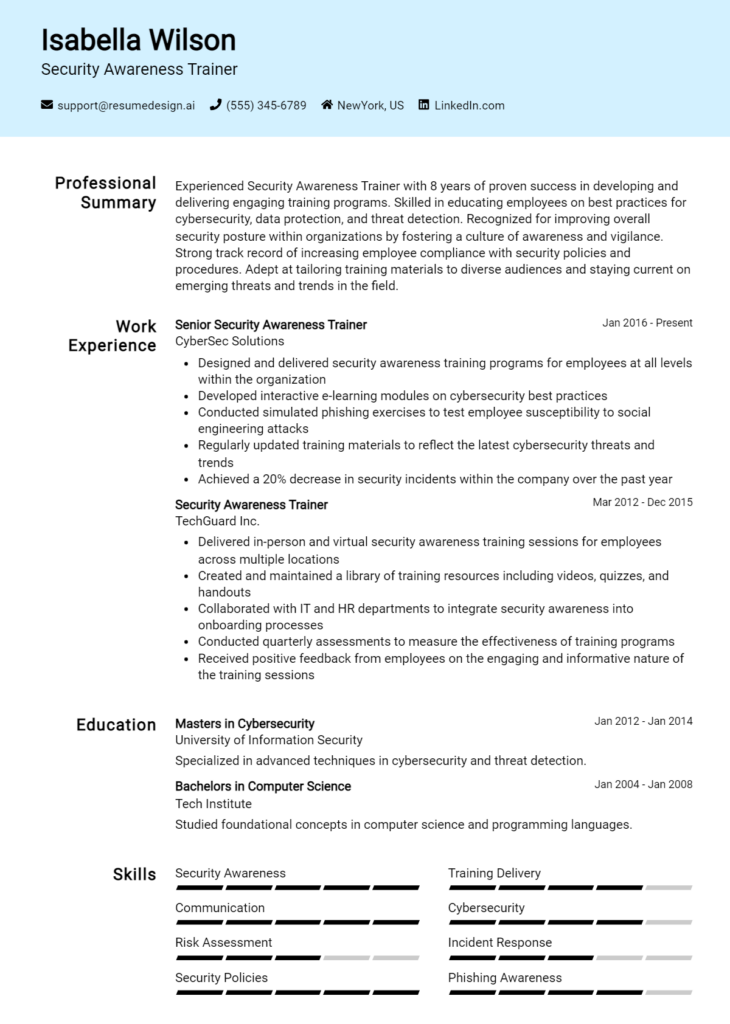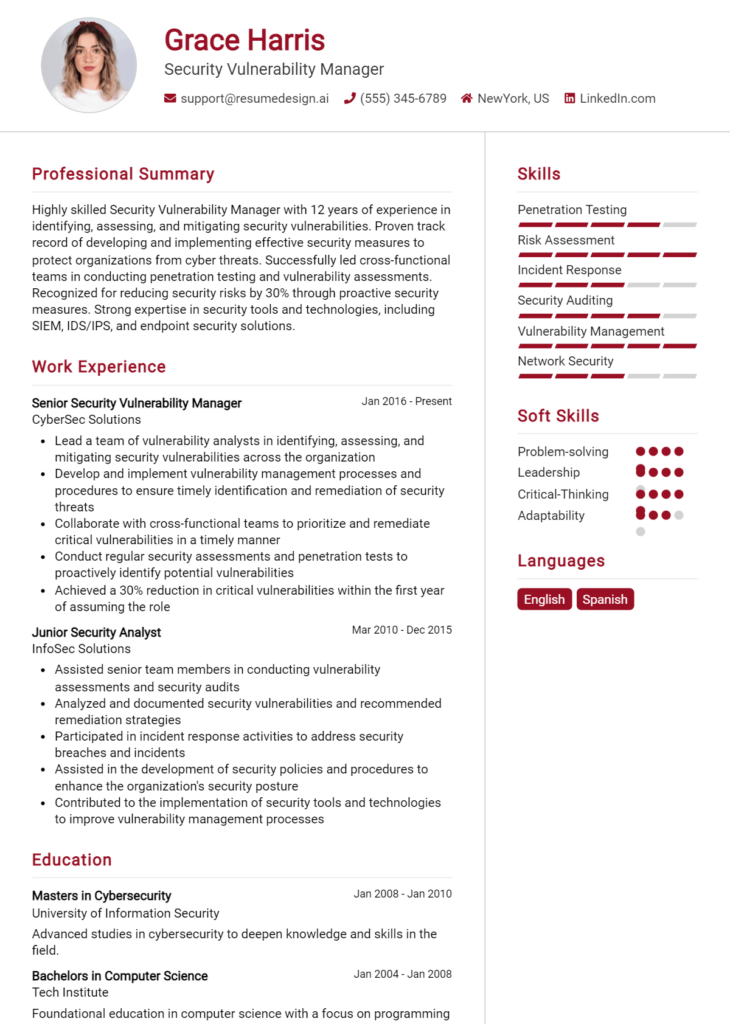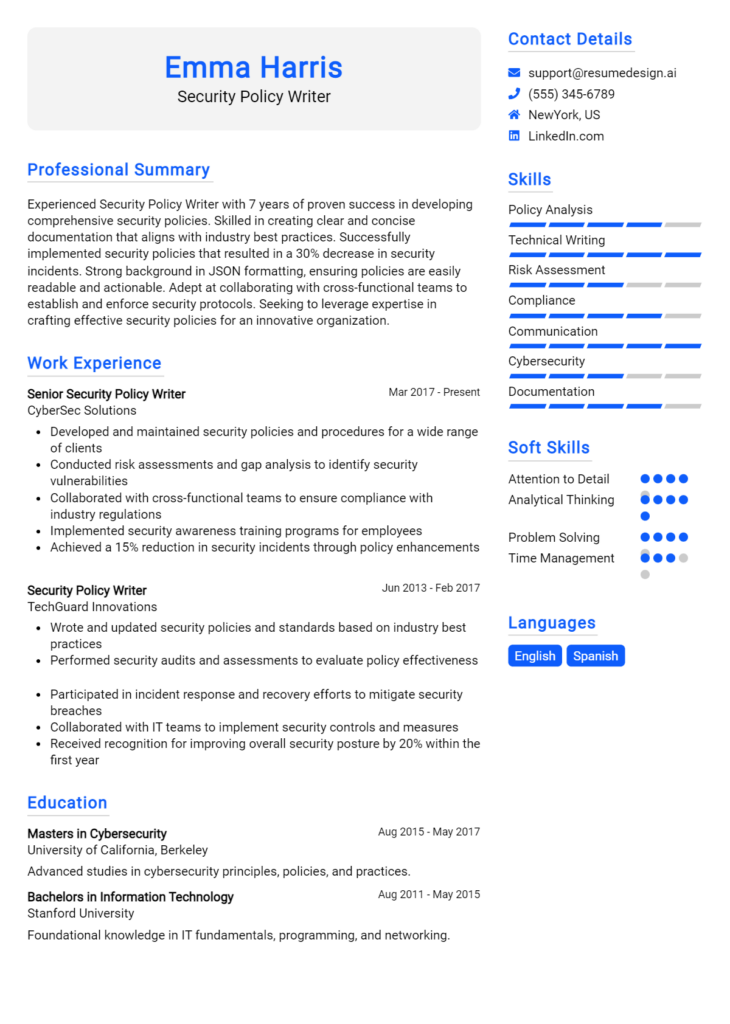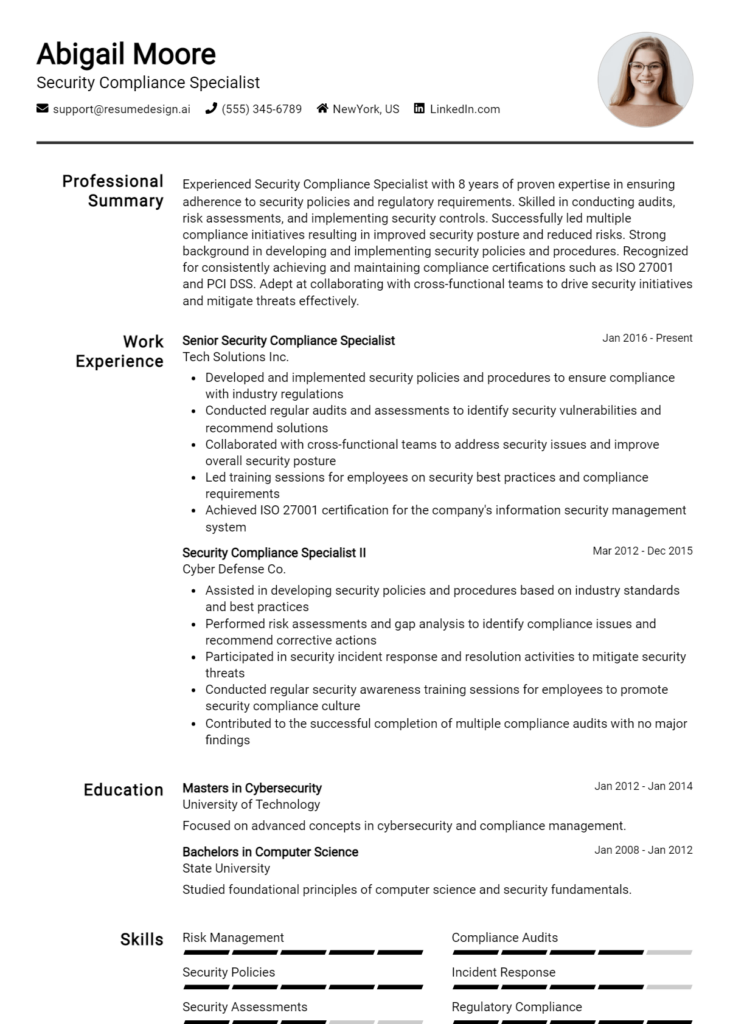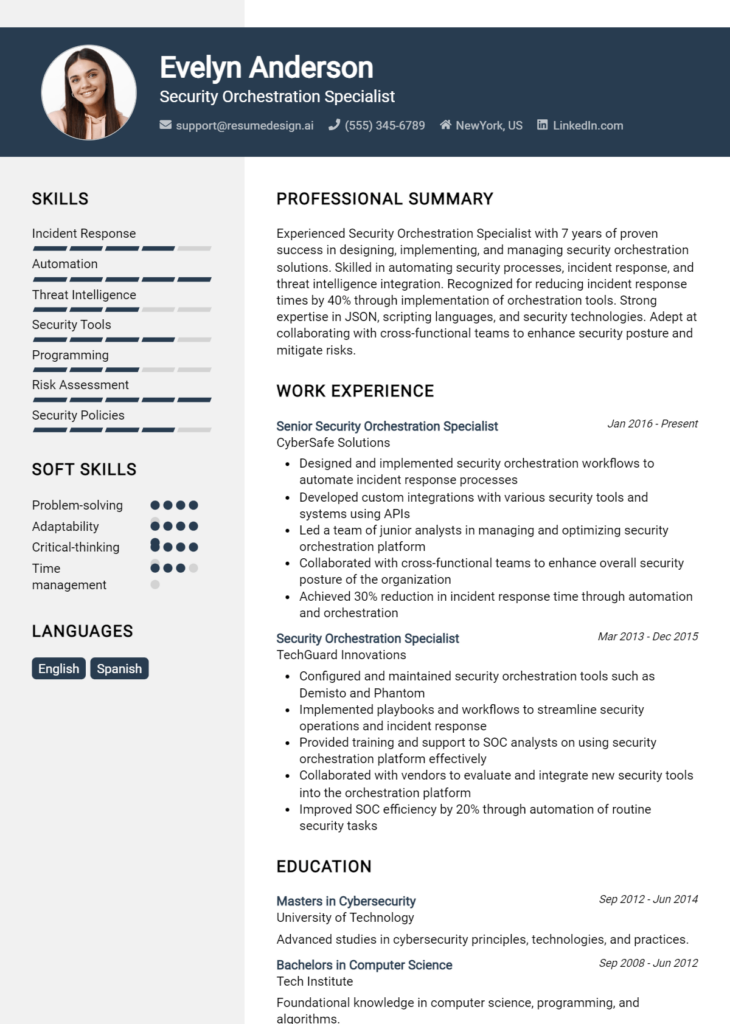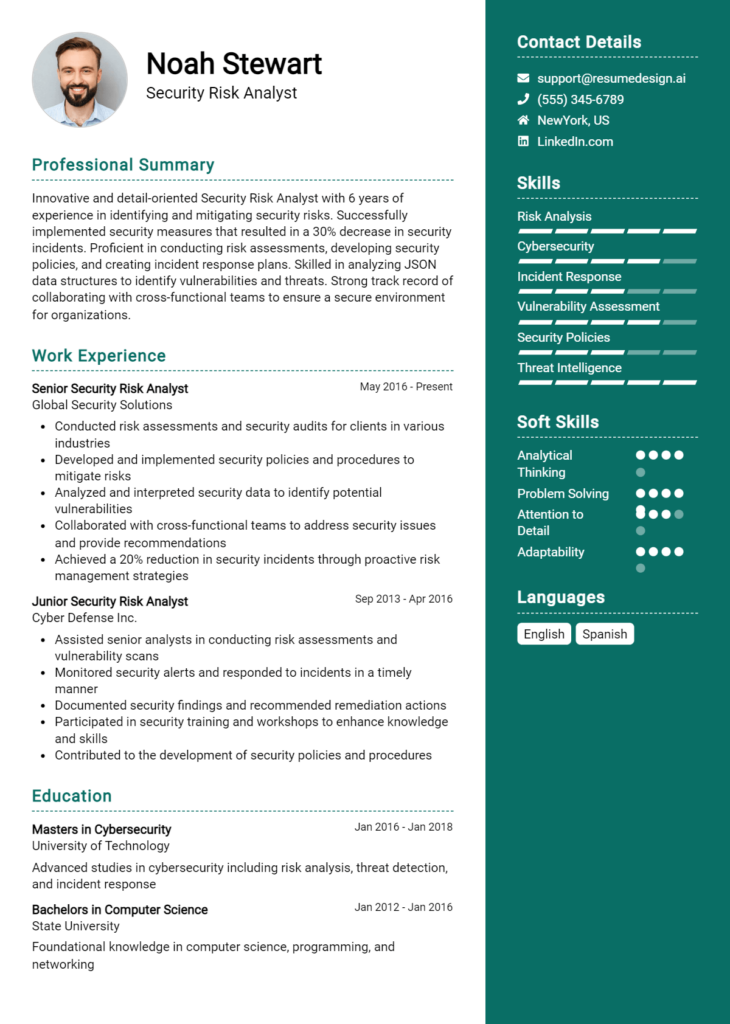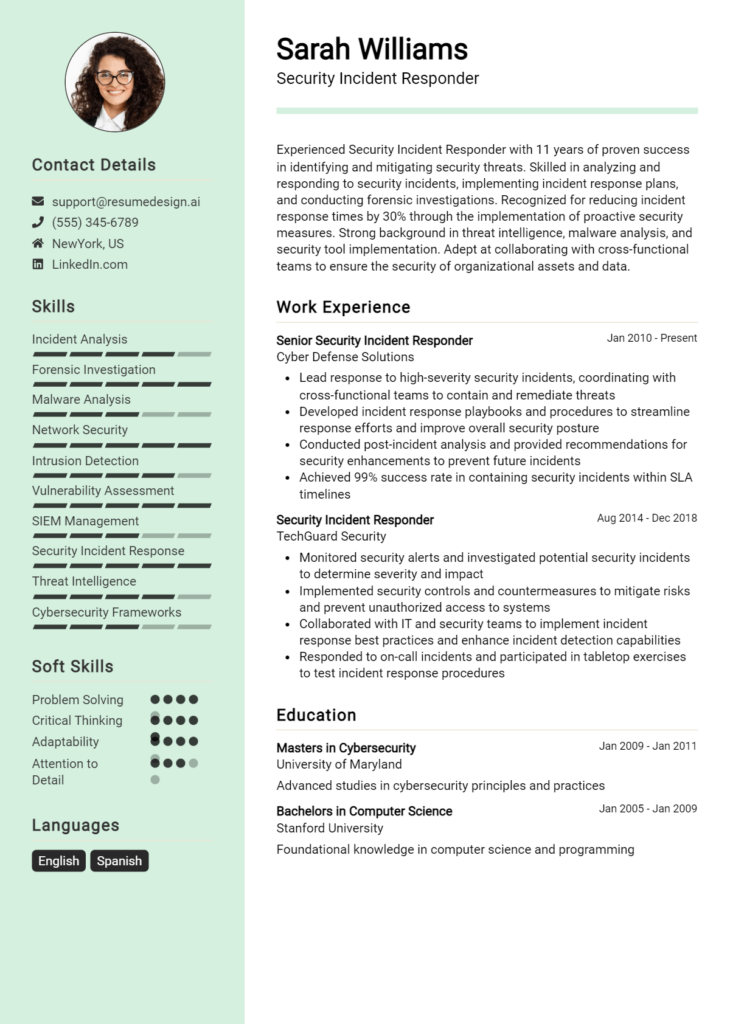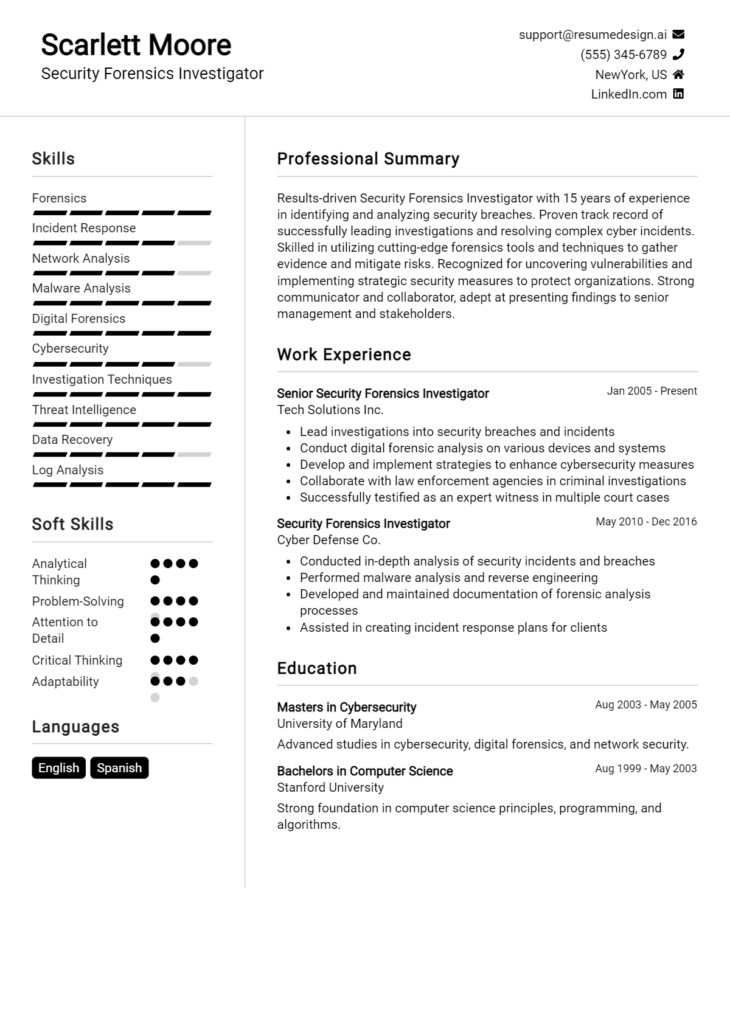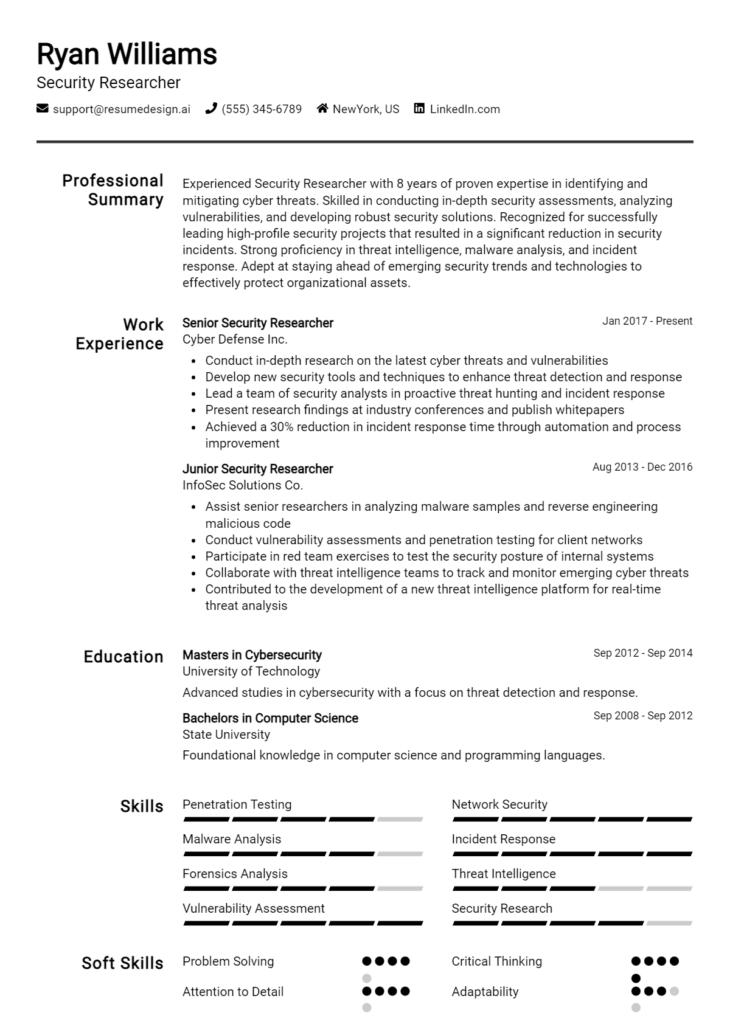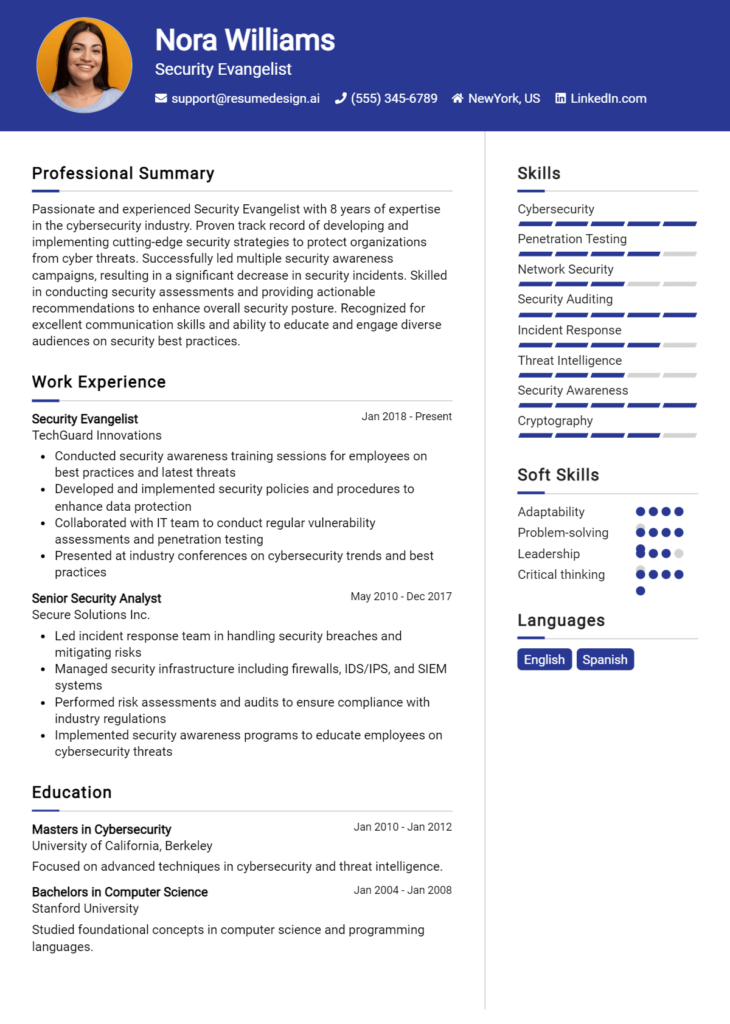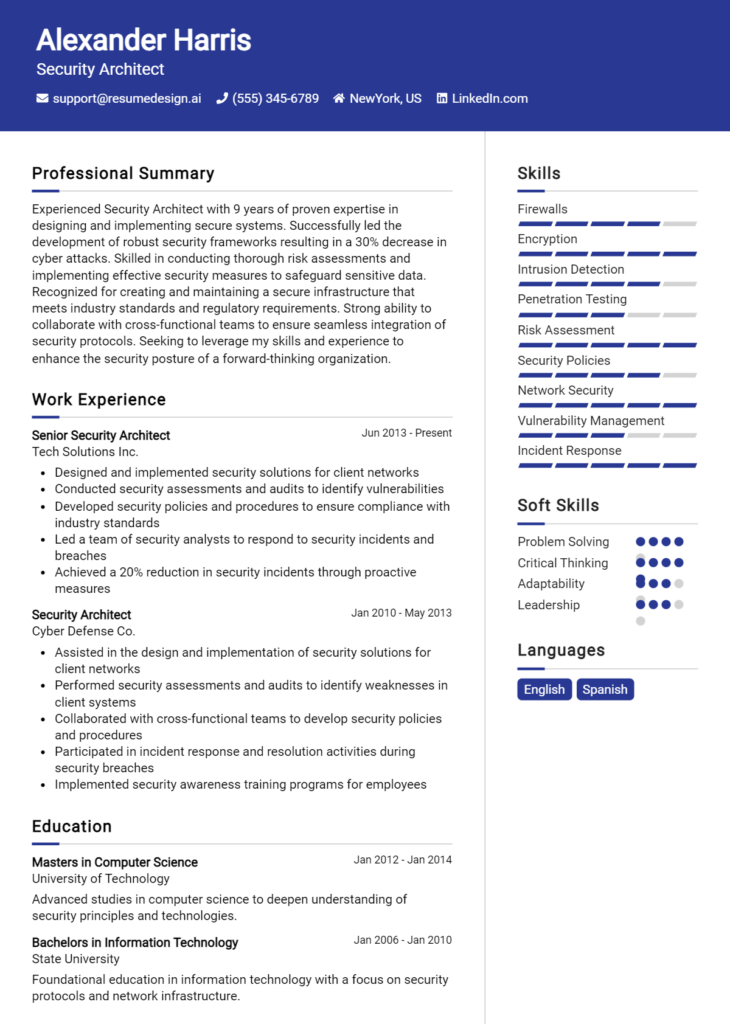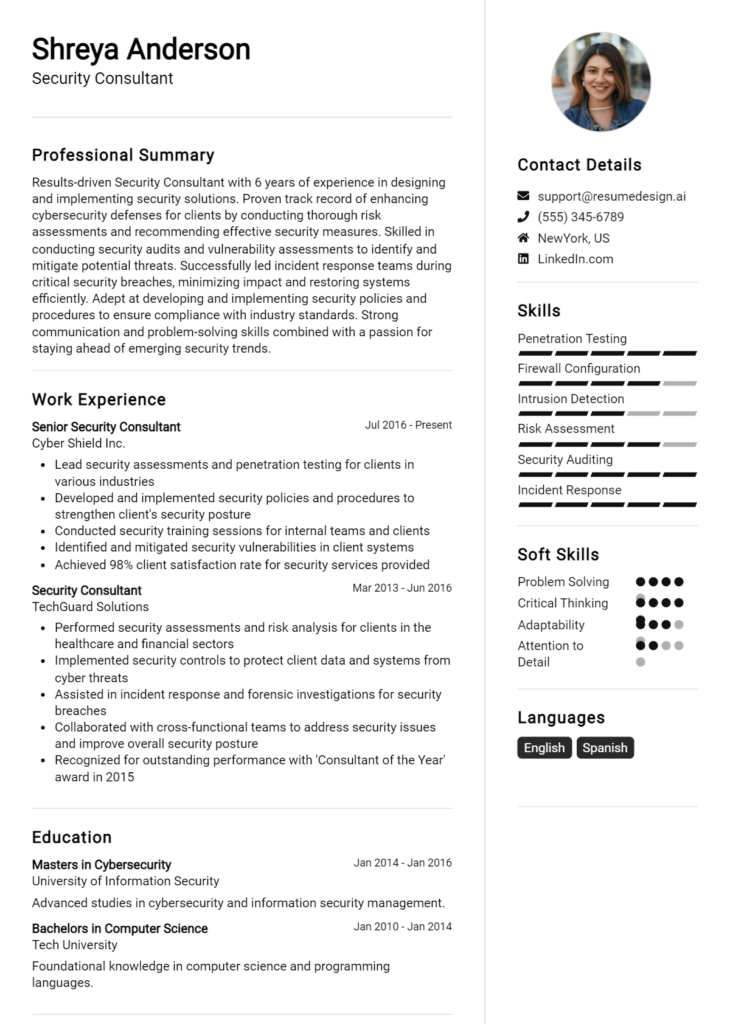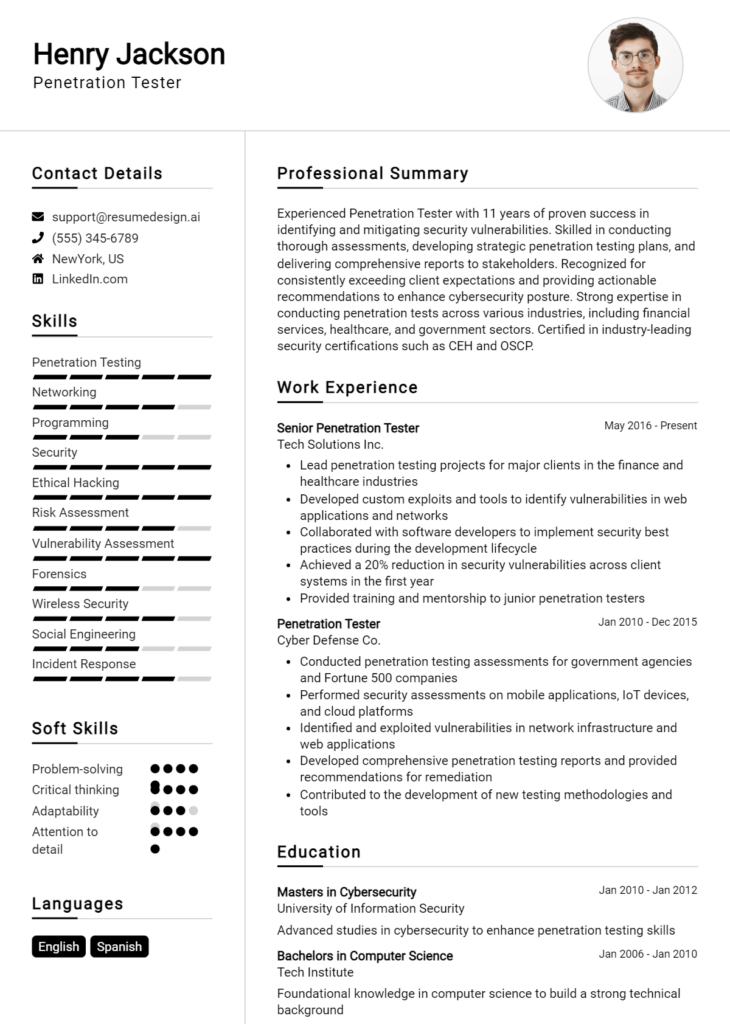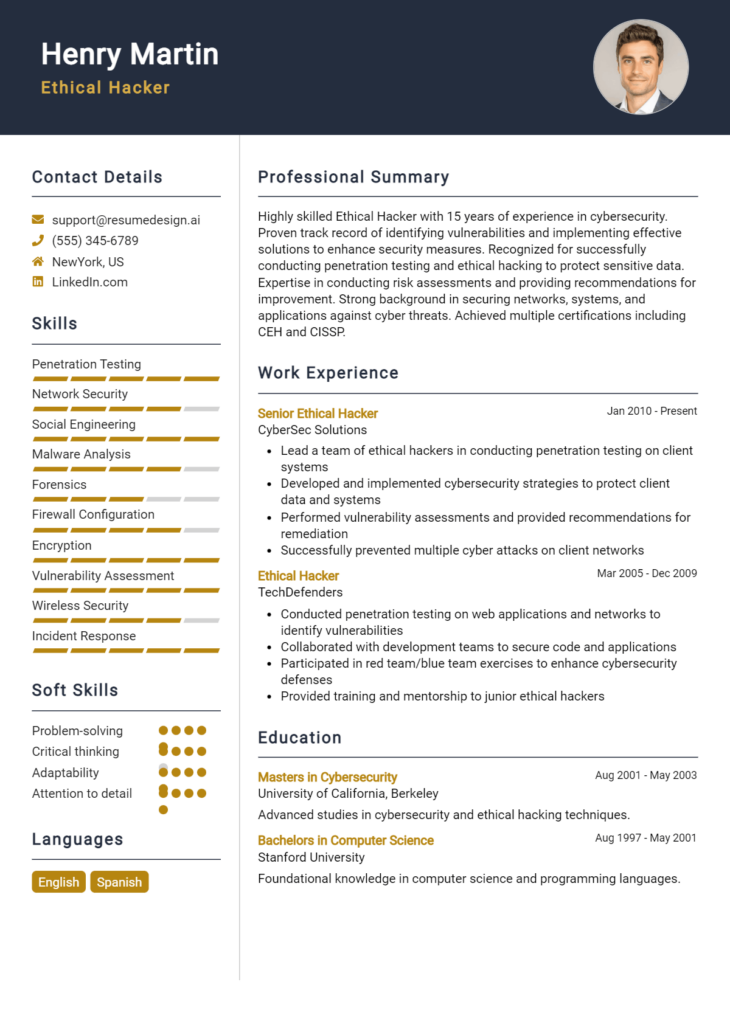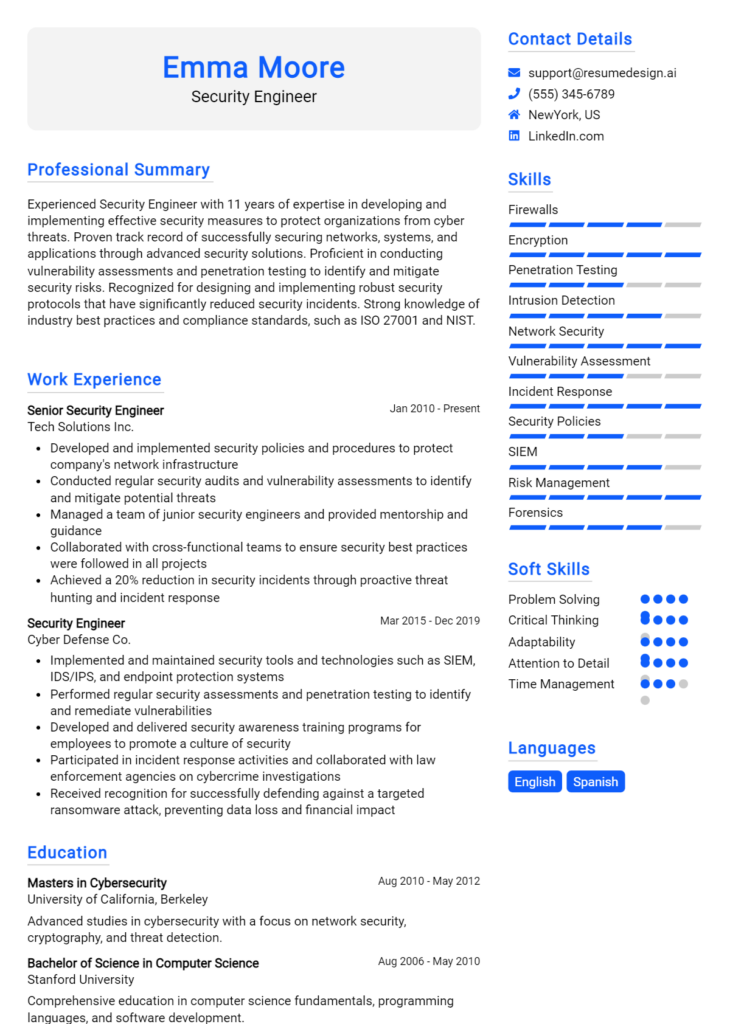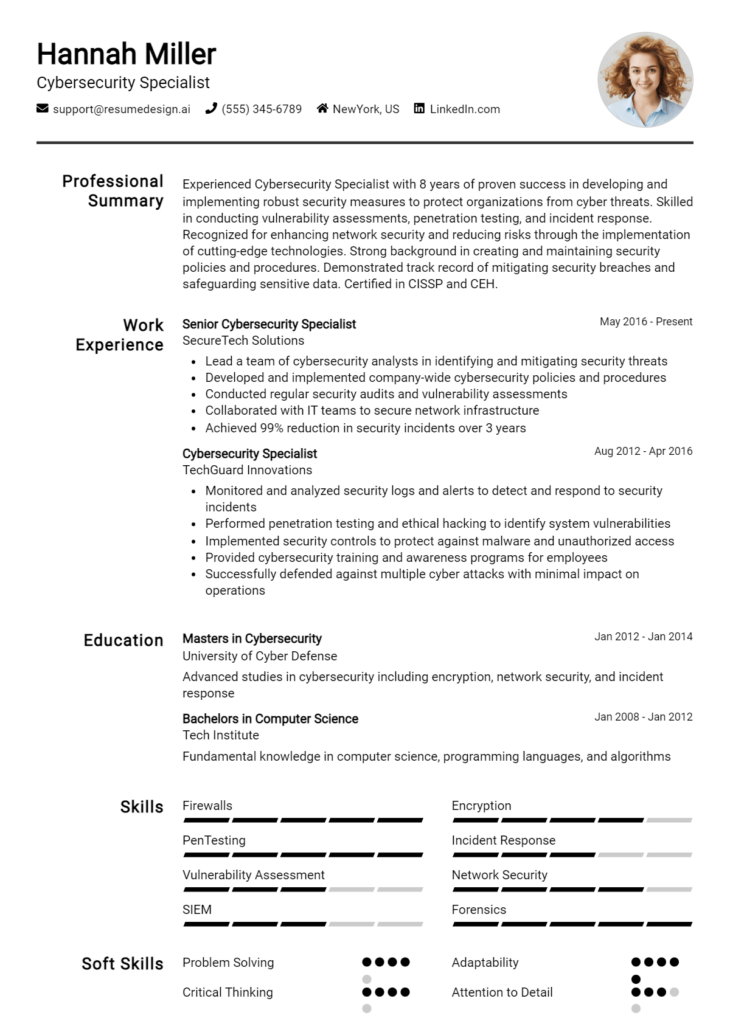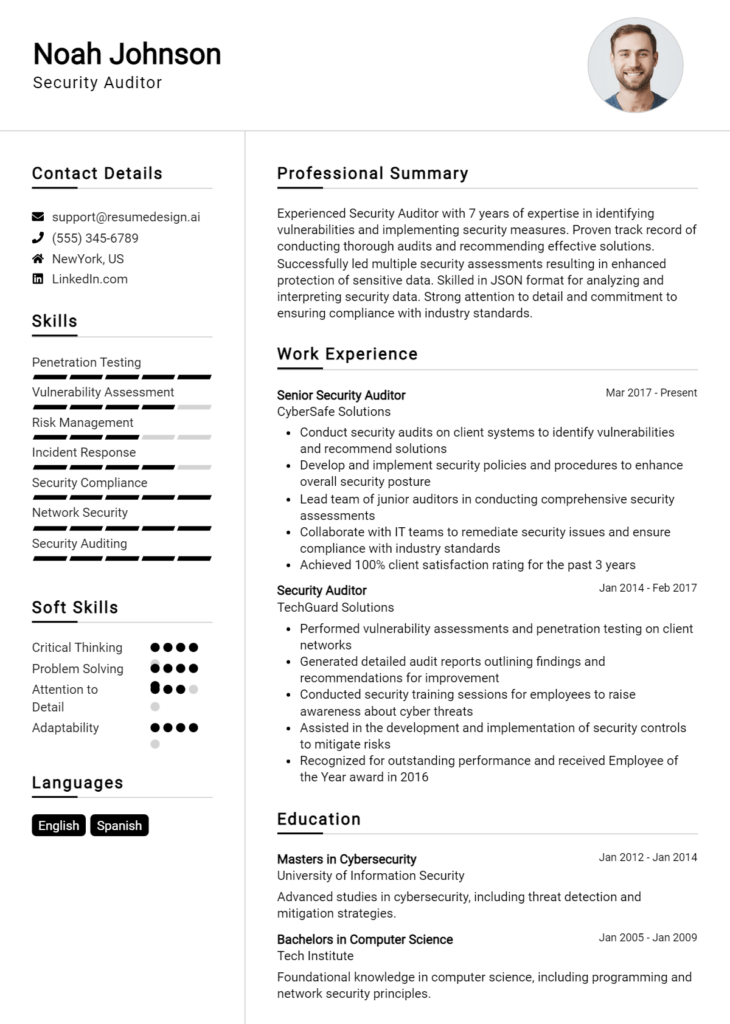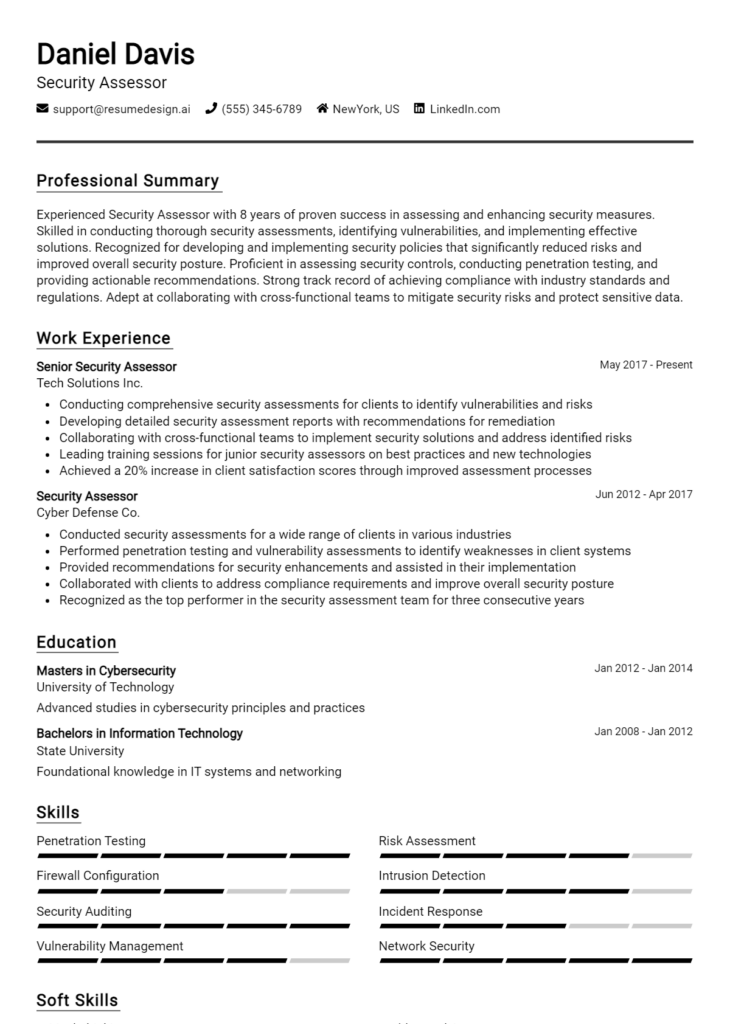Security Analyst Core Responsibilities
A Security Analyst plays a crucial role in safeguarding an organization by monitoring and protecting its information systems. Key responsibilities include identifying vulnerabilities, implementing security measures, and responding to incidents. This role requires technical expertise in cybersecurity tools, operational knowledge of security policies, and strong problem-solving skills. By collaborating with IT, compliance, and management teams, Security Analysts contribute to the organization's overall security posture. A well-structured resume can effectively highlight these qualifications, showcasing the candidate's ability to enhance organizational goals.
Common Responsibilities Listed on Security Analyst Resume
- Conducting regular security assessments and audits.
- Monitoring network traffic for suspicious activity.
- Implementing security protocols and policies.
- Responding to security breaches and incidents.
- Analyzing security alerts and providing recommendations.
- Conducting vulnerability assessments and penetration testing.
- Collaborating with IT teams to ensure system security.
- Staying updated on the latest cybersecurity threats.
- Creating and maintaining security documentation.
- Training staff on security awareness best practices.
- Assisting in compliance with regulatory requirements.
- Evaluating and recommending security tools and technologies.
High-Level Resume Tips for Security Analyst Professionals
A well-crafted resume is essential for Security Analyst professionals, as it serves as the first impression a candidate makes on potential employers. In a field where attention to detail and technical prowess are paramount, your resume must effectively showcase not only your skills but also your achievements. A strong resume tells a compelling story of your experience and capabilities, setting you apart from other candidates in a competitive job market. This guide will provide practical and actionable resume tips specifically tailored for Security Analyst professionals, helping you to present your qualifications in the best possible light.
Top Resume Tips for Security Analyst Professionals
- Tailor your resume to each job description by incorporating relevant keywords and phrases that match the job requirements.
- Highlight your experience with specific security tools and technologies, such as SIEM systems, intrusion detection systems, and vulnerability management tools.
- Quantify your achievements with metrics, such as the percentage of threats mitigated, incidents resolved, or security breaches prevented.
- Include certifications relevant to the field, such as CISSP, CISM, CEH, or CompTIA Security+, to demonstrate your expertise and commitment to professional development.
- Showcase your analytical skills by detailing your experience in risk assessment, threat analysis, and incident response.
- Emphasize your ability to work collaboratively with cross-functional teams, highlighting communication and teamwork skills that are essential in security environments.
- Demonstrate your understanding of compliance frameworks and regulations, such as GDPR, HIPAA, or PCI-DSS, to show your readiness to meet organizational requirements.
- Include a summary statement that encapsulates your professional identity, years of experience, and key accomplishments in the security domain.
- Utilize action verbs to start bullet points, making your responsibilities and achievements dynamic and impactful.
By implementing these tips, you can significantly enhance your resume, increasing your chances of standing out to potential employers in the Security Analyst field. A well-structured and tailored resume not only showcases your qualifications but also reflects your professionalism and dedication to the role, ultimately leading to more interview opportunities and a successful career in cybersecurity.
Why Resume Headlines & Titles are Important for Security Analyst
In the competitive field of cybersecurity, a Security Analyst's resume must stand out among numerous applicants. Resume headlines and titles play a crucial role in capturing the attention of hiring managers and decision-makers. A strong headline or title not only summarizes a candidate's key qualifications in one impactful phrase but also conveys their unique value proposition. It should be concise, relevant, and directly related to the job being applied for, ensuring that the resume makes a strong first impression that encourages further review.
Best Practices for Crafting Resume Headlines for Security Analyst
- Keep it concise and to the point; aim for one to two lines.
- Use specific job titles that align with the position you are applying for.
- Highlight key skills or certifications relevant to the role, such as "CISSP Certified" or "Incident Response Specialist."
- Incorporate impactful action words that demonstrate your contributions, such as "Enhanced," "Secured," or "Mitigated."
- Tailor your headline for each application to reflect the job description and requirements.
- Avoid clichés and generic terms; be original and specific to make your resume memorable.
- Consider including quantifiable achievements, if applicable, to showcase your effectiveness.
- Ensure clarity and readability, avoiding jargon that may not be familiar to all hiring managers.
Example Resume Headlines for Security Analyst
Strong Resume Headlines
"Certified Information Systems Security Professional with 5 Years of Experience in Threat Analysis"
“Results-Driven Security Analyst Specializing in Risk Assessment and Incident Response”
“Proactive Cybersecurity Expert Focused on Network Defense and Data Protection Strategies”
Weak Resume Headlines
“Security Analyst Seeking New Opportunities”
“Experienced Professional in Cybersecurity”
The strong headlines are effective because they clearly articulate the candidate's qualifications, specific expertise, and relevant accomplishments, making an immediate impact on the reader. They are tailored to the job and highlight unique strengths that align with the role. In contrast, the weak headlines lack specificity and fail to convey the candidate’s distinct value, making them forgettable and less likely to capture the interest of hiring managers.
Writing an Exceptional Security Analyst Resume Summary
A resume summary is a critical component for a Security Analyst as it serves as the first impression a hiring manager has of a candidate. A well-crafted summary quickly captures attention by succinctly showcasing the candidate's key skills, relevant experience, and notable accomplishments. It acts as a powerful introduction, providing a snapshot that can set the tone for the rest of the resume. To be effective, the summary must be concise, impactful, and specifically tailored to align with the job description, thereby increasing the chances of moving forward in the hiring process.
Best Practices for Writing a Security Analyst Resume Summary
- Quantify achievements to demonstrate impact (e.g., "reduced security breaches by 30%").
- Focus on relevant skills such as threat analysis, incident response, and risk management.
- Tailor the summary by incorporating keywords from the job description.
- Keep it concise, ideally between 3-5 sentences.
- Highlight certifications and technical proficiencies relevant to the role.
- Use active language that conveys confidence and expertise.
- Showcase alignment with the company’s security goals or objectives.
- Include soft skills, such as teamwork and communication, that demonstrate interpersonal effectiveness.
Example Security Analyst Resume Summaries
Strong Resume Summaries
Detail-oriented Security Analyst with over 5 years of experience in network security and incident response. Successfully reduced security incidents by 40% through proactive threat assessments and the implementation of advanced monitoring tools.
Results-driven Security Analyst with a proven track record in risk assessment and vulnerability management. Achieved a 25% increase in system integrity by developing and enforcing security protocols, earning recognition as Employee of the Month.
Proficient Security Analyst skilled in utilizing SIEM technologies to detect and mitigate threats. Played a key role in a project that led to a 50% decrease in false positives, enhancing overall operational efficiency.
Weak Resume Summaries
I am a Security Analyst with experience in various security tasks and a desire to improve systems.
Dedicated and hardworking professional looking for a position in security analysis. I have knowledge of security practices and tools.
The strong resume summaries are effective because they provide specific details about the candidate’s accomplishments, quantify results, and directly relate their skills to the responsibilities of a Security Analyst. In contrast, the weak summaries lack specificity, fail to highlight any measurable outcomes, and come across as generic, which does not help in distinguishing the candidate from others in a competitive job market.
Work Experience Section for Security Analyst Resume
The work experience section of a Security Analyst resume is vital for demonstrating a candidate's technical acumen, leadership capabilities, and commitment to delivering high-quality security solutions. In this section, candidates have the opportunity to showcase their proficiency in various security tools and methodologies while underscoring their ability to effectively manage teams and collaborate on projects. By quantifying achievements and ensuring alignment with industry standards, candidates can effectively communicate their impact and value to potential employers, making this section a crucial component of their overall application.
Best Practices for Security Analyst Work Experience
- Highlight specific security tools and technologies you have worked with, such as SIEM, IDS/IPS, or firewalls.
- Quantify your achievements with metrics, such as percentage reductions in incidents or improvements in response times.
- Demonstrate your ability to lead projects or teams by including leadership roles or initiatives you spearheaded.
- Showcase collaboration with cross-functional teams to underscore your communication and teamwork skills.
- Use industry-standard terminology and frameworks to align your experience with employer expectations.
- Include certifications or specialized training to reinforce your technical expertise.
- Focus on results-driven statements that emphasize the impact of your contributions.
- Tailor your experience to the specific job description, ensuring relevance and alignment with the role.
Example Work Experiences for Security Analyst
Strong Experiences
- Led a team of 5 analysts in implementing a new SIEM solution, resulting in a 30% reduction in incident response time over six months.
- Developed and executed a comprehensive vulnerability assessment program that identified and remediated 150 critical vulnerabilities, enhancing overall security posture.
- Collaborated with the IT department to deploy a multi-factor authentication system, achieving a 40% decrease in unauthorized access incidents within the first year.
- Spearheaded a security awareness training program that resulted in a 70% increase in employee compliance with security protocols.
Weak Experiences
- Worked on various security tasks within the department.
- Assisted in the implementation of security measures.
- Participated in team meetings regarding security issues.
- Helped with some aspects of vulnerability assessments.
The examples listed as strong experiences are characterized by clear, quantifiable outcomes and specific responsibilities that demonstrate technical expertise and leadership. These statements provide measurable results that highlight the candidate's contributions and impact on security initiatives. In contrast, the weak experiences are vague and lack detail, failing to convey the candidate's skills or achievements effectively. They do not provide the potential employer with the necessary information to assess the candidate's capabilities or contributions to previous roles.
Education and Certifications Section for Security Analyst Resume
The education and certifications section in a Security Analyst resume is crucial as it showcases the candidate's academic background, relevant industry certifications, and commitment to continuous learning. This section helps potential employers assess the candidate's theoretical knowledge and practical skills, which are essential for effectively managing security risks and responding to incidents. By providing relevant coursework, certifications, and specialized training, candidates can significantly enhance their credibility and demonstrate alignment with job requirements, making them more attractive to hiring managers.
Best Practices for Security Analyst Education and Certifications
- Focus on relevant degrees such as Computer Science, Cybersecurity, or Information Technology.
- Include industry-recognized certifications like CISSP, CISM, or CEH to validate expertise.
- Detail relevant coursework that aligns with security analysis skills, such as Network Security or Risk Management.
- Highlight any specialized training that pertains to tools or technologies used in the field.
- Use specific dates to demonstrate when certifications were obtained to show currency in knowledge.
- Prioritize certifications that are highly regarded in the industry over general or outdated credentials.
- Consider including ongoing education efforts, such as workshops or online courses, to show a commitment to professional development.
- Keep the section concise, focusing on quality over quantity to maintain clarity and impact.
Example Education and Certifications for Security Analyst
Strong Examples
- Bachelor of Science in Cybersecurity, XYZ University, Graduated May 2021
- Certified Information Systems Security Professional (CISSP), Obtained March 2022
- Coursework in Network Security, Ethical Hacking, and Incident Response
- Certified Ethical Hacker (CEH), Obtained January 2023
Weak Examples
- Bachelor of Arts in History, ABC College, Graduated June 2019
- Certificate in Basic Computer Skills, Obtained December 2020
- Outdated certification in Windows 7 Administration, Obtained 2015
- High School Diploma, Graduated 2015
The strong examples are considered effective because they directly relate to the skills and knowledge required for a Security Analyst role, showcasing relevant degrees and current industry certifications. In contrast, the weak examples illustrate qualifications that lack relevance to the security field, including outdated certifications and degrees that do not align with the cybersecurity landscape, thus diminishing the candidate's credibility in the eyes of potential employers.
Top Skills & Keywords for Security Analyst Resume
As a Security Analyst, possessing the right skills is crucial for effectively protecting an organization’s information systems from cyber threats. A well-crafted resume that highlights both hard and soft skills can significantly enhance your chances of landing an interview. Employers look for candidates who not only have the technical expertise to analyze and mitigate risks but also possess the interpersonal skills necessary for collaboration and communication within teams. By showcasing your skills, you demonstrate your ability to contribute to a secure and efficient working environment, making you a valuable asset to any organization.
Top Hard & Soft Skills for Security Analyst
Soft Skills
- Analytical Thinking
- Problem-Solving
- Attention to Detail
- Communication Skills
- Team Collaboration
- Adaptability
- Critical Thinking
- Time Management
- Interpersonal Skills
- Decision-Making
- Conflict Resolution
- Stress Management
- Customer Service Orientation
- Ethical Judgment
- Negotiation Skills
Hard Skills
- Security Information and Event Management (SIEM)
- Network Security
- Risk Assessment
- Incident Response
- Vulnerability Assessment
- Penetration Testing
- Firewall Management
- Endpoint Protection
- Malware Analysis
- Cloud Security
- Data Encryption
- Regulatory Compliance (e.g., GDPR, HIPAA)
- Security Architecture
- Forensics and Investigative Skills
- Threat Intelligence
- Scripting and Automation (e.g., Python, PowerShell)
- Identity and Access Management (IAM)
- Security Auditing
For more information on how to effectively present your skills and showcase your relevant work experience, consider exploring additional resources that can help you optimize your resume.
Stand Out with a Winning Security Analyst Cover Letter
Dear Hiring Manager,
I am writing to express my interest in the Security Analyst position at [Company Name], as advertised on [Job Board/Company Website]. With a robust background in cybersecurity and a passion for protecting sensitive information, I am excited about the opportunity to contribute to your team. My experience in threat analysis, vulnerability assessment, and incident response has equipped me with the skills necessary to identify and mitigate potential security risks effectively.
In my previous role at [Previous Company], I successfully managed multiple security projects that resulted in a 30% reduction in security incidents over a 12-month period. I led a team in conducting comprehensive security audits and assessments, utilizing tools such as SIEM and vulnerability scanners to detect and respond to threats proactively. Additionally, my experience with incident response procedures has honed my ability to act swiftly under pressure, ensuring minimal disruption to business operations while effectively addressing security breaches.
I am particularly drawn to [Company Name] because of your commitment to innovation and excellence in security practices. I admire your proactive approach to cybersecurity and believe my technical expertise in firewall management, intrusion detection systems, and threat intelligence aligns well with your organization’s goals. I am eager to bring my analytical skills and collaborative spirit to your team, working together to enhance your security posture and protect valuable assets.
Thank you for considering my application. I look forward to the opportunity to discuss how my background, skills, and enthusiasms can contribute to the success of [Company Name]. I am excited about the possibility of joining your team and helping to safeguard your organization against emerging threats.
Sincerely,
[Your Name]
[Your Phone Number]
[Your Email Address]
Common Mistakes to Avoid in a Security Analyst Resume
When crafting a resume for a Security Analyst position, it's essential to present your qualifications and experiences effectively to stand out in a competitive field. Many candidates make common mistakes that can undermine their chances of landing an interview. By avoiding these pitfalls, you can ensure that your resume highlights your skills and aligns with what employers are looking for. Here are some common mistakes to watch out for:
Vague Job Descriptions: Providing unclear or generic descriptions of previous roles can leave hiring managers confused about your actual responsibilities and achievements. Be specific about your contributions.
Lack of Relevant Keywords: Failing to incorporate industry-specific keywords can result in your resume being filtered out by Applicant Tracking Systems (ATS). Tailor your resume to include terms that match the job listing.
Ignoring Certifications: Not highlighting relevant certifications (e.g., CISSP, CEH, CompTIA Security+) can be a missed opportunity. Certifications demonstrate your commitment to the field and validate your skills.
Inconsistent Formatting: A resume that lacks a consistent format can appear unprofessional. Ensure uniformity in font, bullet points, and spacing to make your resume easy to read.
Overloading with Technical Jargon: While technical skills are crucial, using excessive jargon can make your resume inaccessible to non-technical hiring managers. Strike a balance between technical language and clarity.
Neglecting Soft Skills: Focusing solely on technical abilities without mentioning soft skills like communication, teamwork, or problem-solving can be a mistake. These skills are often just as important in a Security Analyst role.
Failing to Quantify Achievements: Not providing measurable outcomes of your work can weaken your resume. Whenever possible, use numbers to demonstrate the impact of your efforts, such as reducing incidents by a certain percentage.
Omitting Tailoring for Each Application: Sending the same resume for every job application can lead to missed opportunities. Customize your resume for each position to reflect the specific skills and experiences relevant to that role.
Conclusion
As a Security Analyst, your role is crucial in safeguarding an organization's information systems against cyber threats. Throughout this article, we have delved into the essential skills required for a Security Analyst, such as threat detection, incident response, and risk assessment. We've also highlighted the importance of technical proficiency in various tools and technologies, along with the need for continuous learning to stay ahead in this ever-evolving landscape.
In addition to technical skills, we discussed the significance of communication and teamwork, as Security Analysts often collaborate with other departments to ensure comprehensive security measures are in place. The ability to analyze data, identify vulnerabilities, and implement effective security protocols is key to your success in this role.
As you reflect on the insights shared, we encourage you to take a moment to review your Security Analyst resume. A well-crafted resume can make a significant difference in showcasing your expertise and landing your next opportunity. To assist you in this process, consider utilizing our available resources:
- Explore our resume templates to find a design that suits your professional style.
- Use our resume builder for a step-by-step guide in creating a compelling resume.
- Check out our resume examples for inspiration on how to effectively present your skills and experience.
- Don't forget to enhance your job applications with our cover letter templates that can help you make a strong first impression.
Taking the time to refine your resume and cover letter will position you well in the competitive job market for Security Analysts. Start today and take the next step toward advancing your career!

